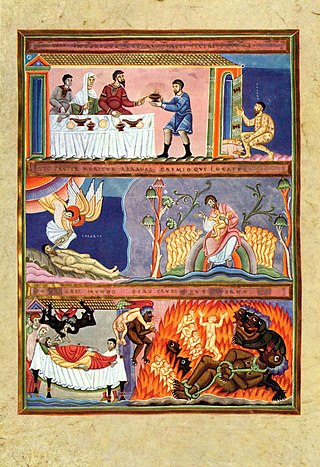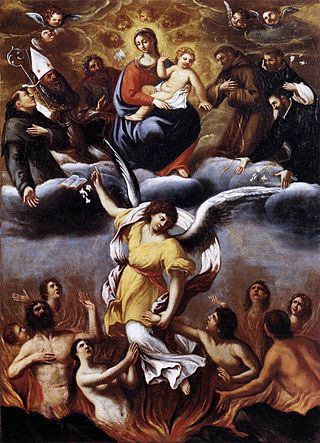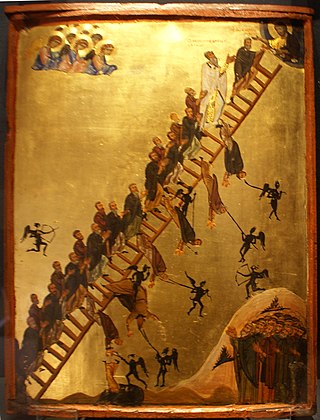Related Research Articles
The afterlife or life after death is a purported existence in which the essential part of an individual's stream of consciousness or identity continues to exist after the death of their physical body. The surviving essential aspect varies between belief systems; it may be some partial element, or the entire soul or spirit, which carries with it one's personal identity. Belief in an afterlife is in contrast to the belief in oblivion after death.

In Catholic theology, Limbo is the afterlife condition of those who die in original sin without being assigned to the Hell of the Damned. Medieval theologians of Western Europe described the underworld as divided into three distinct parts: Hell of the Damned, Limbo of the Fathers or Patriarchs, and Limbo of the Infants. The Limbo of the Fathers is an official doctrine of the Catholic Church, but the Limbo of the Infants is not. The concept of Limbo comes from the idea that, in the case of Limbo of the Fathers, good people were not able to achieve heaven just because they were born before the birth of Jesus Christ. This is also true for Limbo of the Infants in that simply because a child died before baptism, does not mean they deserve punishment, though they cannot achieve salvation.

Eternity, in common parlance, means infinite time that never ends or the quality, condition, or fact of being everlasting or eternal. Classical philosophy, however, defines eternity as what is timeless or exists outside time, whereas sempiternity corresponds to infinite duration.
The problem of Hell is an ethical problem in the Abrahamic religions of Christianity, Islam and Judaism, in which the existence of Hell for the punishment of souls in the Afterlife is regarded as inconsistent with the notion of a just, moral, and omnipotent, omnibenevolent, omniscient supreme being. Also regarded as inconsistent with such a just being is the combination of human free will, and the divine qualities of omniscience and omnipotence, as this would mean God would determine everything that has happened and will happen in the universe—including sinful human behavior.
In Islam, Jahannam is the place of punishment for unbelievers and other evildoers in the afterlife, or hell. This notion is an "integral part of Islamic theology", and has "occupied an important place in the Muslim belief". It is often called by the proper name Jahannam. Simultaneously, jahannam is a term specifically for the upper most layer of hell.

Eschatology: Death and Eternal Life is a book written by Joseph Cardinal Ratzinger, originally published in German in 1977 and subsequently translated into English in 1988. The book is the study of the "eschaton", the end times in accordance with the Christian doctrine, such as the parousia, heaven, and hell. Among the issues addressed in it is the concept of purgatory, which he argues may be existential—not temporal—in duration.
Eternal security, also known as "once saved, always saved", is the belief that from the moment anyone becomes a Christian, they will be saved from hell, and will not lose salvation. Once a person is truly "born of God" or "regenerated" by the indwelling of the Holy Spirit, nothing in heaven or earth "shall be able to separate (them) from the love of God" and thus nothing can reverse the condition of having become a Christian.

In Christian eschatology, the Four Last Things or four last things of man are Death, Judgment, Heaven, and Hell, the four last stages of the soul in life and the afterlife. They are often commended as a collective topic for pious meditation; Saint Philip Neri wrote, "Beginners in religion ought to exercise themselves principally in meditation on the Four Last Things." Traditionally, the sermons preached on the four Sundays of Advent were on the Four Last Things.

In religion and folklore, hell is a location or state in the afterlife in which souls are subjected to punitive suffering, most often through torture, as eternal punishment after death. Religions with a linear divine history often depict hells as eternal destinations, the biggest examples of which are Christianity and Islam, whereas religions with reincarnation usually depict a hell as an intermediary period between incarnations, as is the case in the dharmic religions. Religions typically locate hell in another dimension or under Earth's surface. Other afterlife destinations include heaven, paradise, purgatory, limbo, and the underworld.

Particular judgment, according to Christian eschatology, is the divine judgment that a departed (dead) person undergoes immediately after death, in contradistinction to the general judgment of all people at the end of the world.

In Christian theology, Hell is the place or state into which, by God's definitive judgment, unrepentant sinners pass in the general judgment, or, as some Christians believe, immediately after death. Its character is inferred from teaching in the biblical texts, some of which, interpreted literally, have given rise to the popular idea of Hell. Theologians today generally see Hell as the logical consequence of rejecting union with God and with God's justice and mercy.

Hades, according to various Christian denominations, is "the place or state of departed spirits", borrowing the name of Hades, the Greek god of the underworld. It is often associated with the Jewish concept of Sheol.
Christian universalism is a school of Christian theology focused around the doctrine of universal reconciliation – the view that all human beings will ultimately be saved and restored to a right relationship with God. "Christian universalism" and "the belief or hope in the universal reconciliation through Christ" can be understood as synonyms. Opponents of this school, who hold that eternal damnation is the ultimate fate of some or most people, are sometimes called "infernalists."

In ancient Rome, a refrigerium was a commemorative meal for the dead, consumed in a graveyard.
In Christianity, annihilationism is the belief that after the Last Judgment, all damned humans and fallen angels including Satan will be totally destroyed, cremated, and their consciousness extinguished rather than suffering forever in Hell. Annihilationism stands in contrast to both the belief in eternal torment and the belief that everyone will be saved ("universalism"). However, it is also possible to hold to a partial annihilationism, believing unsaved humans to be obliterated or cremated, but demonic beings to suffer forever.

Purgatory is, according to the belief of some Christian denominations and Islam, an intermediate state after physical death for expiatory purification. The process of purgatory is the final purification of the elect, which is entirely different from the punishment of the damned. Tradition, by reference to certain texts of scripture, sees the process as involving a cleansing fire. Some forms of Western Christianity, particularly within Protestantism, deny its existence. Other strands of Western Christianity see purgatory as a place, perhaps filled with fire. Some concepts of Gehenna in Judaism resemble those of purgatory.
Christian theology is the theology of Christian belief and practice. Such study concentrates primarily upon the texts of the Old Testament and of the New Testament, as well as on Christian tradition. Christian theologians use biblical exegesis, rational analysis and argument. Theologians may undertake the study of Christian theology for a variety of reasons, such as in order to:

In Christianity, heaven is traditionally the location of the throne of God and the angels of God, and in most forms of Christianity it is the abode of the righteous dead in the afterlife. In some Christian denominations it is understood as a temporary stage before the resurrection of the dead and the saints' return to the New Earth.
Svargarohana Parva or the Book of the Ascent to Heaven, is the last of eighteen books of the Indian epic Mahabharata. It traditionally has 6 chapters. The critical edition has 5 chapters. It is one of the shortest books in the Mahabharata.

The first circle of hell is depicted in Dante Alighieri's 14th-century poem Inferno, the first part of the Divine Comedy. Inferno tells the story of Dante's journey through a vision of hell ordered into nine circles corresponding to classifications of sin. The first circle is Limbo, the space reserved for those souls who died before baptism and for those who hail from non-Christian cultures. They live eternally in a castle set on a verdant landscape, but forever removed from heaven.
References
- ↑ The Decline of Hell: Seventeenth-Century Discussions of Eternal Torment. Walker DP. Chicago: University of Chicago Press, 1964
- ↑ Philip C. Almond, Heaven and Hell in Enlightenment England, p.97. ISBN 978-0521101257
- ↑ Alice Bennett, Afterlife and Narrative in Contemporary Fiction, p.204. ISBN 1137022698.